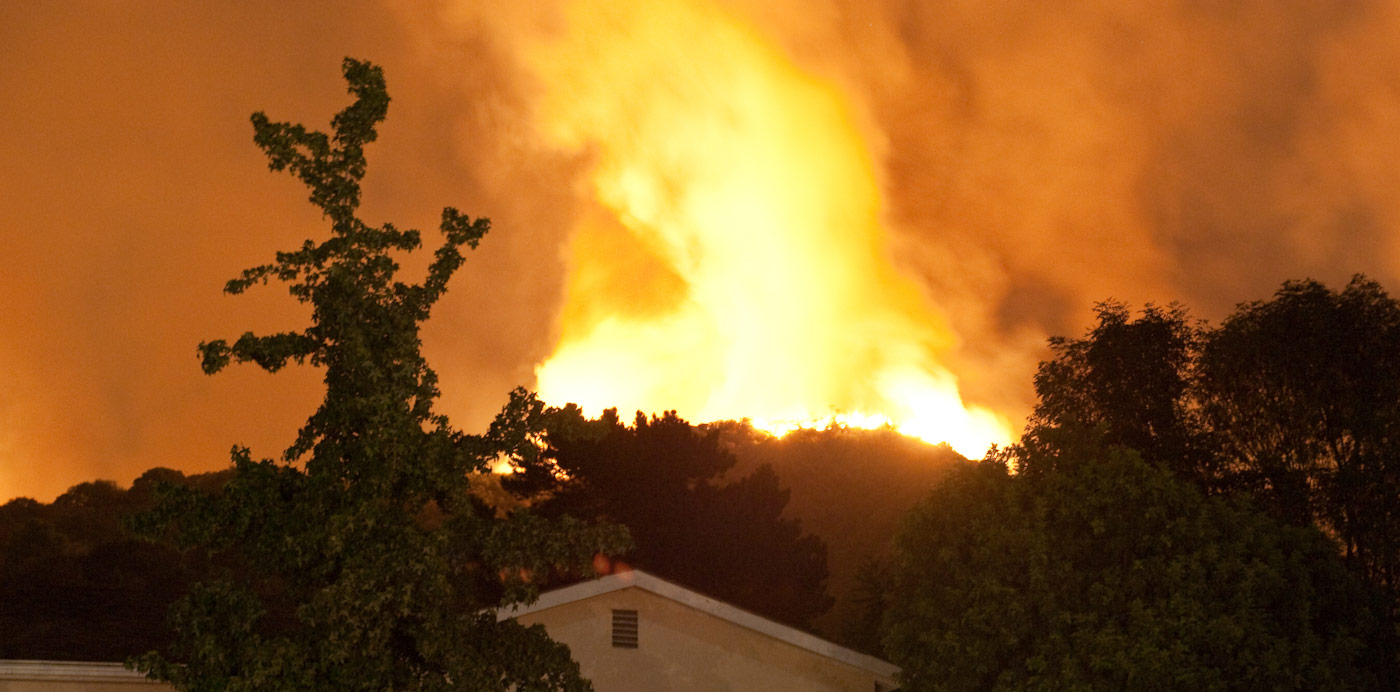
This past November, the Gold Coaster sat down with Roosevelt Scholars Charles Hua ’22 and Simon Levien ’23 to talk about their work over the past summer surveying the state of the environmental movement at the College. The picture produced by the studies, commissioned by the FDR Foundation, reveals a student body fractured by divisions and strangely unworried about climate change’s impact on its future.
GC: Gentlemen, it’s a pleasure to speak with you both. Simon, my first question is for you. Tell us a little bit about the work you’ve been doing for the FDR Foundation on the subject of climate change.
SL: This summer the FDR Foundation embarked on an ambitious project to chart the course of the Harvard environmental community and capture the opinions of Harvard undergraduates regarding environmental and sustainability issues. More specifically, we wanted to put words to how a Harvard student navigates the environmental space in terms of both extracurriculars as well as considering careers and majors. We reached out to the leaders of nearly every environmental or sustainability club on campus and conducted dozens of interviews so they could speak their mind on Harvard’s environmental community. For the second half of our efforts, we surveyed a significant portion of the freshman class at Harvard to gauge how first-years plan to navigate this community. We asked them about the sustainability issues they were most concerned about, how likely they were to join an environmental organization, and so on. Through these interviews and student data we hope to develop a series of recommendations for the Harvard administration to improve this space on campus.
GC: Charles, you’ve been involved in climate issues since high school; what do you think of the state of affairs with the student organizations at Harvard?
CH: I’ve been pleased to see that there are many students at Harvard who are passionate about climate and environmental issues and have taken the time and effort to pursue these interests both in and out of the classroom. That said, there’s always opportunity for improvement. I would be personally interested in seeing a larger portion of the Harvard student body engaging in climate and environmental issues through coursework, clubs, and internships. I also think the environmental community at Harvard would benefit from greater collaboration among the student organizations in confronting some of the most pressing climate issues today. In many ways, I think a lot of different sustainability-related organizations are operating in their own niches, and are certainly doing good jobs in those spaces, but there is significant room for greater collaboration between the groups. Furthermore, I would like to see student organizations that are not explicitly sustainability- or climate-focused to begin to engage in programming that explores the intersections between climate change and other political, social, and cultural issues. I really do think that climate change is a multidisciplinary, cross-cutting issue that will ultimately affect all of humanity, and I believe that having a more diverse range of student organizations engaging in these topics will be crucial.
GC: Simon, from your research, how do other universities compare?
SL: Harvard’s peers generally seem to be doing an equal or better job. It was a common sentiment among leaders of student environmental organizations that the community was extremely fragmented and they oftentimes did not feel adequate institutional support. The most notable comparison comes from Yale. Yale’s environmental groups have formed an Undergraduate Council of sorts for their sustainability clubs: Yale Student Environmental Coalition. YSEC — containing the leadership of the major environmental groups on campus — is a hub of social meetings, combines efforts to rally support behind certain causes, runs sustainability projects, and overall seems to do a great job of community building. There is no equivalent at Harvard.
GC: Let’s talk a little bit about the study results. Not a very pretty picture, it seems.
SL: The environmental community seemed to be very fractured between different environmental groups. Divest Harvard seemed to be particularly polarizing. While the majority of students give Divest their support, others questioned its place in the environmental community, in that it diverts student engagement from what some view as more practical and productive efforts—the old conundrum about it being far easier to protest than actually do. As for the first-year students we surveyed, Harvard’s Class of 2024 generally had an awareness of climate change but no real plans or thoughts on how to keep sustainability in mind, no matter their future career choice. There seems to be the perception that unless you are a strict conservationist or environmental scientist, sustainability may not fit neatly in your career plans, especially if you are to go into traditional Harvard careers, like finance or consulting. Generally many student leaders have said that arms of the University that deal with environmental issues do not provide enough undergraduate student-facing resources. Many said that they instead turn to friends for career advice or to professors, who are a saving grace.
GC: It was startling to read that more than half the students responding to the poll didn’t believe that climate change would impact their career trajectory. How exactly is that possible? From your research and interviews, did you get a sense of whether Harvard students are aware that their individual carbon footprint is exponentially higher than that of an average student in a large state school or local college?
SL: The dissociation is hard to explain. Regarding the carbon footprint size, we don’t yet have concrete data on that, but there are certainly costs and lifestyle choices Harvard students make more often than others that are environmentally costly. There generally seems to be a behavioral disconnect between student activities and opinions and their carbon costs.
GC: Charles, it would seem Harvard students have a major disconnect between the seriousness of the crisis and its impact on their future lives and careers. How do you account for that?
CH: For me, personally, this has definitely been a question that’s been on the top of my mind ever since I got to Harvard. It’s interesting to me that, although the vast majority of Harvard students recognize that climate change is a serious issue and a smaller, but still substantial, portion of the student body understands the role they play in contributing to climate change, only a significantly smaller portion of the student body actively engages in these topics outside of the classroom. To me, it’s difficult to see this disconnect between theoretical perceptions of the issue and demonstrated actions to address it. There are likely many reasons for this — a lack of exposure to opportunities in the space, misconceptions about what work in sustainability actually looks like — but I think it comes down to the fact that Harvard students are incredibly busy, and moreover generally prefer more certain career pathways that have well-defined tracks (for example, a summer internship at a finance or consulting firm that recruits early and offers a high-paying return job offer right out of college), and therefore view as “most desirable” only a limited set of career pathways after graduation. In many senses, you see and follow what your peers do. And when so many peers are pursuing careers in a concentrated group of firms within a small, non-diverse bucket of industries, it often feels like pursuing a career in sustainability is not a realistic option. There are so many unknowns. But I think there are countless ways that we can change that. I think it’s absolutely necessary that Harvard collectively broadens and deepens its engagement with sustainability and climate issues. I think we could certainly benefit from more faculty conducting research on these topics, the establishment of a school or institute designated for sustainability and climate topics, greater climate-related course offerings, increased investment in bringing greater awareness of the diverse range of sustainability careers (particularly in fields that intersect with Harvard students’ interests, like cleantech venture capital, impact investing, or renewable energy finance), and a host of other necessary solutions. Changing perceptions is critical.
GC: Charles, it seems that interested students are indicating that they don’t know where to go or whom to talk to about potential careers in sustainability. Now granted these are first-years. What has been your experience?
CH: I’ll be the first to admit that figuring out what to do during — let alone after — college is daunting and difficult. I’ve often questioned what it is that I really want to do in terms of my personal career path. So I definitely empathize with that sentiment! In some ways, I think that sense of uncertainty can actually be a constructive and important thing — to independently wrestle with the question of how one personally wants to leverage their Harvard education to achieve their goals. I do think greater institutional support in engaging students around climate-related issues could make the process easier — whether it’s through the Office of Career Services (OCS), professors, departments, houses, alumni, or other resources.
GC: So Simon, what are the next steps?
SL: Double and triple check our findings, and then summarize it all. We hope to interface our results with various Harvard admins afterwards.
GC: Charles?
CH: Continue pursuing sustainability and climate opportunities in and out of the classroom, and tagging along with others in their discoveries. To me, sustainability is such an interesting and dynamic topic, and, when you learn something new every day, it’s hard not to get excited to continue learning and exploring.
Sample Survey Results
The invitation to participate in the survey was posted by the FDR Foundation in the Yard News, sent to all incoming first-years by the College in August 2020. The survey received 205 responses, representing approximately 12% of the incoming first-year class.
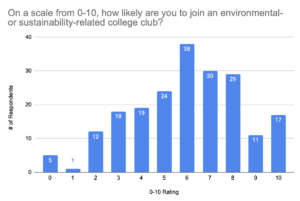
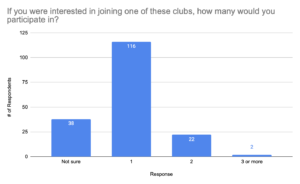
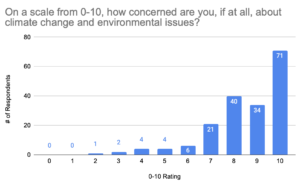
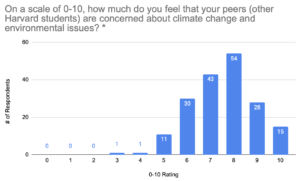
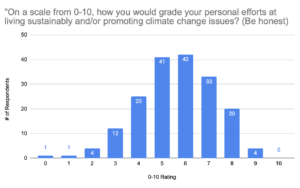
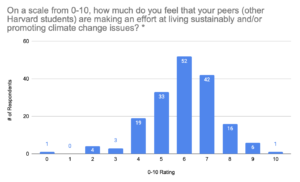
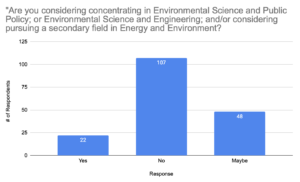
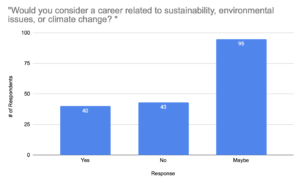
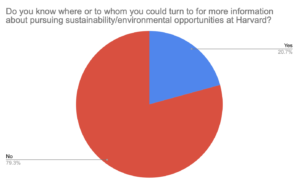
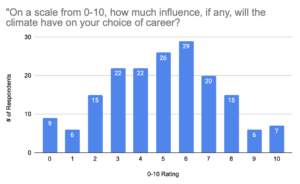
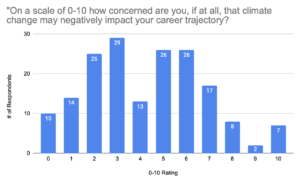
Want a click link to help out our undergraduate programming? Click the button below!
